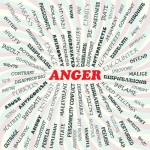Anger is one of the most basic and also most important emotions. It is necessary for survival as the feeling often generates the necessary strength to do things to protect ourselves that we normally could not do. Anger is also necessary in the infant’s development of sense of self as distinct from others. Everyone has anger. Why then is this important emotion so difficult for people to deal with? Why does anger produce so much denial of the feeling? And so much fear?
The answers, once again, go back to our training. We have been taught, since we were little, that being angry is “bad” and that other people do not like us when we are angry. We learn that most of our anger is unjustified (as if feelings need justification) and that we have no right to be angry because we must consider the other person’s feelings before we consider ourselves. We have learned as children to deny our feelings of anger and to repress them so that we will not be labeled “bad.” If we cannot deny or repress the anger and we let it out, then we feel guilty and have to make justifications for our feelings. We have learned, usually before the age of five, that anger produces a vicious trap: if we express it, we are “bad,” if we repress it, it grows into rage and we are “bad,” and if we deny it, we learn not to trust our own feelings and that feels “bad.” What is the solution to this anger trap?
Give yourself permission to feel angry. You cannot control your feelings of anger. You not always know when and why and how you will feel angry. Sometimes you may feel angry without knowing why. And sometimes, when you would expect to feel angry, you do not. Anger lives inside of you along with your feelings. Accept that you can feel angry. But do not confuse the feeling of anger with the expression of anger. You cannot control the feeling of anger but you can control what you choose to do when you are angry.
Our training has taught us to confuse the feeling of anger with the angry behaviors that we exhibit. Most of us are afraid what we do when we are angry. We have repressed and denied our anger until it explodes and we are in a rage. We then act in a destructive manner, to others and to ourselves. Accepting the angry feeling as it occurs is enough. Remember, we do not always have to act on our feelings and our thoughts. We can choose what we will do and we have a wide variety of choices.
Practice saying to yourself when you feel angry: “I am angry. What do I want to do with this? How can I feel okay with my anger?” Sometimes you may choose to express it to others. Sometimes you may choose to think about it for a while before you act on it. Sometimes you may want to yell and get upset and sometimes you may want to calmly talk about it. And, once in a while, you may choose to let it go and to do nothing about it. There is no one right way to act when angry. Any behavior you choose is right as long as you take responsibility for it and you feel all right with yourself. If you cannot get pass your anger and let it go, ask for help. Most of the time, recognizing that you are angry at the moment you feel it and accepting your feeling without judgment is enough for the feeling to abate. Just as you cannot control your feelings, your feelings cannot control you, unless you choose to let them. ☀︎
